WASHINGTON — If any proof is needed that the Nov. 3, 2026, congressional midterms weigh on the minds of House Speaker Mike Johnson, R-Benton, and House Majority Leader Steve Scalise, R-Jefferson, then look no further than the remarkable $44 million the two last week announced having raised to help Republican candidates.
Republicans hold 220 of the House’s 435 seats and 218 are needed for a bare majority. Johnson and Scalise so far have been able to pass controversial bills by one and two votes.
The GOP can’t afford to lose support from more than three of its members in the coming weeks when Congress takes up the “big beautiful” budget bill that will include President Donald Trump’s legislative agenda.
That slim majority — and history — give Democrats hope that, come the 2026 midterm elections, they could seize control of one of the levers of power that the GOP now controls. Since the 1970s, with the exception of 2002, the party whose candidate lives in the White House lost control of the House in the midterms.
Crystal Ball, the respected political handicapping outfit affiliated with the University of Virginia, last week found Democrats narrowly ahead 209-207 in seats safe for one party or the other. Nineteen races are toss-ups.
“Democrats should flip the House next year,” Crystal Ball predicted.
All of Louisiana’s four Republican and two Democratic House incumbents are considered safe.
Last week, the Democratic Congressional Campaign Committee released its list of 35 targeted House seats. That number includes 10 seats in districts Trump won by at least 10 percentage points in November; three GOP seats in districts Vice President Kamala Harris won; and eight others that are considered competitive.
“House Republicans are running scared, and they should be. They’re tanking the economy, gutting Medicaid, abandoning our veterans and making everything more expensive. In short, they’ve lost the trust of their constituents, and it’s going to cost them the majority,” DCCC Chair Suzan DelBene, a Democratic representative from the state of Washington, said in a statement.
Johnson raised more money than any other Republican speaker during a midterm cycle — a feat he sees as the nation rallying around Trump’s policies to shrink the size of government, raise tariffs on imported goods, and deport immigrants who snuck into the country without proper documentation.
“The American people are enthusiastic about keeping House Republicans on offense in 2026. While we deliver our commonsense America First agenda, we are also building a massive campaign war chest by hitting the ground running in the first quarter,” Johnson said in a statement.
The money mostly is distributed to GOP candidates, committees and state parties.
As a mid-level House manager before ascending to the top spot in October 2023, Johnson didn’t shine at fundraising. Open Secrets, a Washington-based nonprofit that tracks campaign contributions, showed that, for the 2022 election cycle, Johnson raised $1.3 million while the average House member brought in $3 million.
In the 2024 cycle, as speaker, Johnson upped his game by raising $19 million, coming largely from retirees, pro-Israel groups and Lockheed Martin, the government’s largest contractor, according to the data Open Secrets organized.
He announced harvesting $32.2 million during the first three months of 2025 for the 2026 campaign. The latest reports, which are through March 31, haven’t yet been analyzed.
Scalise, on the other hand, has been a leading fundraiser for years. It’s part of the reason why he has been in the top echelons of Republican power since 2014. He has raised more than $225 million since joining leadership.
Open Secrets found that Scalise, in the 2024 election cycle, relied on conservative groups, Realtors, pro-Israel factions and retirees for the funds he raised. Similar to Johnson’s latest haul, the analysts haven’t had time to collate the information that was given to the Federal Elections Commission week before last.
Scalise announced gathering more than $12 million in the first quarter of the 2026 election cycle.
“It's more important than ever we deliver President Trump an even stronger House Majority, and we're working overtime to ensure we have the resources required to stay competitive and the top-tier candidates we need to win,” Scalise said.


